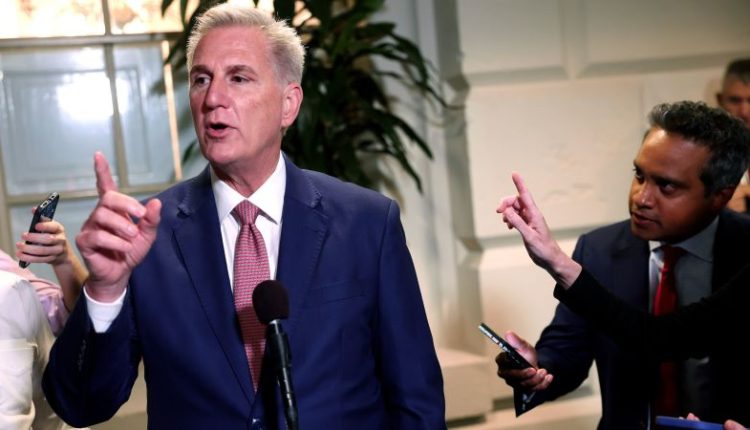With just five days to go, there is still no viable plan in Congress to avert a government shutdown and a sense of inevitability has set in as lawmakers brace for federal funding to expire at the end of the week.
Leadership in both chambers wants to pass a short-term funding extension, but a bloc of hardline House conservatives have railed against the prospect of a stopgap bill and ramped up pressure on Speaker Kevin McCarthy to choose between a shutdown or a vote to oust him from his leadership post.
Lacking the GOP votes to pass a stopgap bill, McCarthy is turning attention early in the week toward an effort to advance a series of spending bills, including for the departments of Defense and Homeland Security.
Passing those bills won’t stop a shutdown at the end of the week, but as conservatives demand the passage of full-year funding bills, McCarthy had been hoping that momentum on the measures might swing enough holdouts to support a Republican stopgap bill. However, it is not clear that even those bills can advance amid deep divisions within the House Republican conference.
McCarthy is expected to face yet another test of his leadership on Tuesday as House GOP leadership has indicated that they plan to hold a procedural vote on a rule to advance those measures. The expected vote comes after hardliners tanked a similar procedural vote for a defense bill last week in a major embarrassment for the House GOP leaders. All eyes will be on the House to see if that spectacle repeats itself.
Meanwhile, Senate Majority Leader Chuck Schumer and Senate Minority Leader Mitch McConnell are still in talks over a short-term bill to keep the government open past September 30, though there’s no guarantee any Senate plan will be able to pass the House.
Senate leaders are discussing a proposal that could pass the chamber quickly and not get bogged down by procedural hurdles. One outstanding question: How to deal with $16 billion in aid for natural disasters and $24 billion to help Ukraine, according to two Senate aides familiar with the matter.
The two sides are discussing whether to include some of that funding request or punt it until a later date. Also unsettled: the duration of the stop-gap resolution. If they include Ukraine funding, GOP Sen. Rand Paul of Kentucky has threatened to slow down the bill’s passage.
The Senate is set to take an initial procedural vote on Tuesday evening to advance the House-passed Federal Aviation Administration reauthorization bill – which could be used as a legislative vehicle for the Senate’s version of a stopgap bill to prevent a shutdown.
Legislative text of a Senate stopgap bill has not yet been formally unveiled. But Schumer indicated last week that bringing up the House-passed FAA bill could give the Senate a path to avoid a shutdown. A stopgap funding extension could be tacked onto the FAA bill since the FAA’s current authority to operate will expire at the end of September, creating another looming deadline for lawmakers to act.
McCarthy urged against a shutdown on Monday, optimistically suggesting that he thinks Republican leadership has the votes for Tuesday’s expected procedural vote, but he said he would leave the final assessment to the designated vote counters in the House GOP conference.
“Well, we’ve had a number of people who say that they would vote for the rule,” he said, but added that he would “leave that up to the whip.”
“I think we are much stronger when we stay open,” McCarthy said of the prospect of a government shutdown.
A shutdown would have major impacts that would be felt across the country. If that were to happen, many government operations would come to a halt, while some services deemed “essential” would continue.
Government operations and services that continue during a shutdown are activities deemed necessary to protect public safety and national security or considered critical for other reasons. Examples of services that have continued during past shutdowns include border protection, federal law enforcement and air traffic control.
Read the full article here

